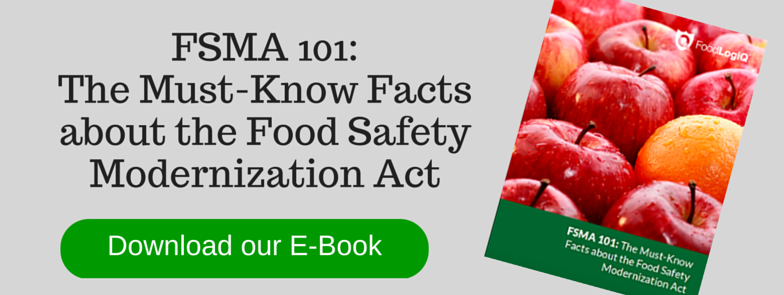Food companies continue to prepare for the Food Safety Modernization Act rulings released in September 2015 and are beginning to get FSMA-ready as the deadline for compliance approaches for many companies next year.
One of the key pillars of this landmark legislation is around preventive controls - the practices that facilities will use to address any hazards that their products might be exposed to in the facilities. To give you a general understanding of this important FSMA component, we’ve pulled together five keys things to understand about preventive controls.
What are preventive controls?
According the FDA, FSMA will transform the agency’s approach to food safety from a system that far too often responds to outbreaks rather than prevents them. It does so by requiring food facilities to evaluate the hazards in their operations, implement and monitor effective measures to prevent contamination - and have a plan in place to take any corrective actions that are necessary.
Preventive controls are scientifically- and risk based-based practices that facilities use to address hazards that their products might be exposed to. Once preventive controls are in place, facilities should monitor them to make sure they are working as they were designed.
What’s new about this?
While the concept of preventive controls is certainly not a new concept, what has changed is how the FDA can address it. For the first time, FDA has a legislative mandate to require comprehensive, prevention-based controls across the food supply.
What should be included in our preventive controls plan?
FDA’s intention is that all covered facilities - facilities that manufacture, process, pack or hold food - would need to develop a plan; identify the hazards, identify and implement preventive controls; and then monitor to make certain that the controls work. However, not every facility will have the same hazards or preventive controls. Each plan should be tailored to fit the facility and the risks associated with the facility's food.
Is FSMA under effect now?
The requirement is not effective now and will not be effective before FDA issues a final rule implementing the requirements. Firms need to continue to comply with Current Good Manufacturing Practices. Further, FDA does not anticipate that the new preventive control requirements will replace CGMPs. Rather, CGMPs will form the foundation for preventive controls.
Will all of the requirements apply to all facilities?
FSMA provides for exemptions or modified requirements in certain circumstances, such as when a facility is already required to comply and is in compliance with seafood or juice HACCP, or if a facility is very small. FDA will address and explain these aspects of the law as part of the rulemaking process to implement the preventive controls provision. There will be guidance and a proposed and final rule issued from the FDA with ample opportunity for public comment

Other posts you might be interested in
View All Posts
Food Safety
10 min read
| March 29, 2023
Supplier Management Best Practices and Tips in the Modern Food Era
Read More
Food Industry
6 min read
| October 8, 2019
A Focus on Consumers Trends, Traceability, and Food Efficiency in 2019
Read More
Trustwell News
4 min read
| March 15, 2022

